Fractional share investment is simply where you acquire a fraction of a security (e.g. a share, or index tracker fund).
Whilst fractional share ownership is possible for UK shares, it is most popular when acquiring US shares where certain shares can cost thousands of dollars per share. For example, Berkshire Hathaway, Alphabet (Google parent company) or Amazon shares. Without fractional share ownership, many smaller investors would be priced out of these opportunities.
How does fractional share ownership work?
Fractional shares do not trade on the open market. Therefore in order to acquire fractional shares, you must sign up with select investment platforms which offer that functionality.
The platform that you invest with typically holds the fractional shares for you, in a nominee account. Shares will be legally owned by a non-trading subsidiary of the platform (a ‘nominee company’). This nominee company receives any dividends/shareholder rights. However, the shares are ringfenced and the nominee must pass on any dividends to you, the ‘beneficial owner’ of the shares.
Were the broker to go into administration, your shares would remain your property and cannot be touched by creditors.
Investment platforms will typically buy or sell whole shares certain shares and then track which of their customers owns fractional portions of those shares.
Can I get fractional shares without buying them?
It’s also possible to own fractional shares without setting out to invest in them specifically. For example:
- In a share split situation (e.g. a 3-for-2 share split), it is possible for investors to end up owning fractional shares. For example, the owner of 5 shares would end up with 7.5 shares.
- Through dividend reinvestment plans where dividend payments do not cover the price of a full share.
- M&A activity can also result in fractional share ownership where the transaction results in new common shares being created using an agreed upon ratio for shareholders in the existing companies.
Will I be paid dividends with fractional shares?
Yes, when you own fractional shares, you benefit from dividend payments based on the fraction of the share that you own.
For example, if you own 10% of an Amazon share, you will receive 10% of the value of each dividend Amazon pays its shareholders for a single share.
Benefits of fractional share ownership
The number one benefit of fractional share ownership is that it reduces the financial barriers to entry of acquiring expensive shares. For example, let’s imagine you have £5,000 to invest and want some exposure to Amazon shares. If you bought one share, you would need to spend £2,000 (40% of total initial investment). However, if you bought one quarter of an Amazon share for £500 (10% of total initial investment), this would reduce your exposure / reliance on the performance of that one share.
Another benefit of fractional share ownership is that it can potentially increase returns. How? Cash that may have sat uninvested until your account had sufficient funds to buy whole new shares can now be invested immediately to buy a fraction of those shares.
Finally, fractional share ownership makes it a lot easier for relatively small investors to achieve higher levels of diversification due to the low cost of entry.
Drawbacks of fractional share ownership
In terms of drawbacks:
- As fractional shares do not trade on the open market, you will likely have to buy and sell those shares with the same investment platform.
- Depending on the investment platform and share you are buying or selling, you may find that you are unable to trade instantly. For example, trades may go through only once there are enough investors collectively buying or selling fractional shares equalling one whole share. This naturally limits the amount of trading investors can engage in.
- Again, depending on the fee structure of the investment platform you are using, you may incur higher levels of proportional fees given you are trading smaller volumes of shares.
How to invest in fractional shares (for UK investors)
Currently, the most popular platforms for fractional share ownership for investors in the UK are Trading 212 and FreeTrade. Both platforms offer low fees for share trading.
For example, at the time of writing, Trading 212 charges zero commission on trades. It makes its money from the buy-sell spread of share prices. Where buying securities in a foreign currency, it features a 0.15% FX conversion charge. FreeTrade operates a similar model charging zero commission, but slightly higher FX conversion charge of 0.45%.
It is important to select a platform which offers commission free trading when investing in fractional shares because otherwise fees will eat into your returns.
Fractional share investing can be a good option for smaller investors who want exposure to expensive shares which would otherwise have been out of reach. It is free to open standard accounts at both Trading 212 and FreeTrade if you would like to explore their fractional share ownership offerings further.


